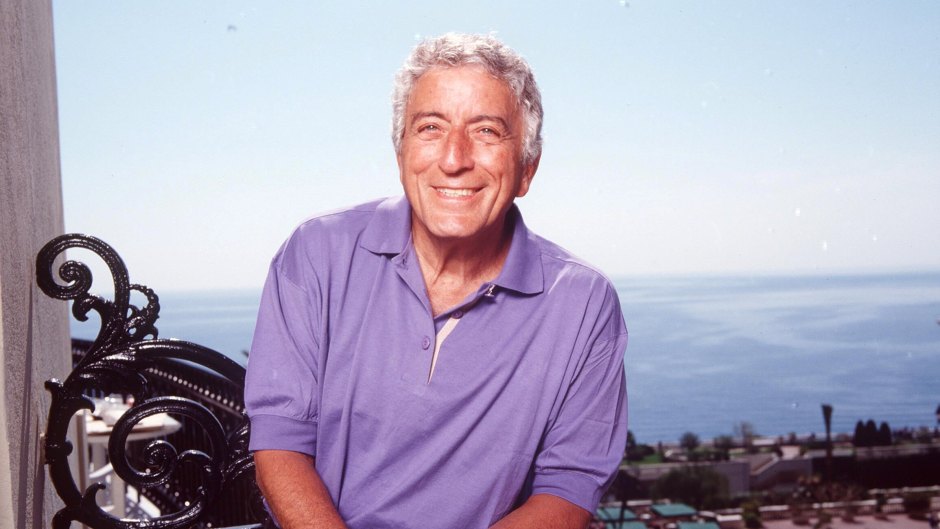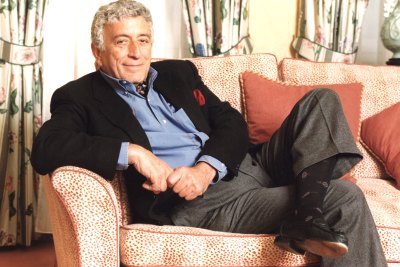
Geoff Wilkinson/Shutterstock
Tony Bennett’s Son Danny Helped Him Find ‘Freedom’ to Express Himself ‘Freely’ Before Death
One year after he learned he had Alzheimer’s disease, Tony Bennett insisted that he continue to record, perform and tour. “He tells me, ‘Hey, as long as my voice doesn’t wobble and people like me, I’m going to keep singing until I die,’” his son and manager Danny Bennett said in 2017.
Over his long life, Tony, who passed away on July 21 at age 96, never let anything keep him from the stage. “I could have retired years ago,” he said, “but I just love what I’m doing.” And it always showed.
The Grammy-winning star, born Anthony Benedetto to Italian immigrant parents in Queens, New York, lost his father at age 10. “My father inspired my love for music,” said Tony, who worked in a laundry, as an elevator operator and as a copyboy to help his family. At one point in his youth, he made $15 a week as a singing waiter. “It was almost Chaplinesque,” Tony recalled. “I’d get a request, and [the other waiters would] teach it to me right on the spot.”

In the early hours, he’d slip into nightclubs to watch jazz musicians jam. Occasionally, he’d even be invited to sing. Tony was just gaining traction as a performer — he called himself Joe Bari — when he was drafted to serve in the Army infantry during World War II. “A front-row seat in hell,” said Tony, who was among the troops who liberated a subcamp of the infamous Dachau concentration camp in Germany.
Upon Tony’s return to New York, he took classes in theater, painting and operatic bel canto singing technique on the G.I. Bill. “It was tough at first. Many times, I lived on my mama’s carfare to get into New York,” he recalled. “Then I got lucky.”
Make that double lucky. In 1950, Pearl Bailey invited Tony to become the first white singer in her Greenwich Village revue. At one of those performances, Tony impressed audience member Bob Hope so much that the comedian offered to take him on tour. However, Tony’s initial joy would soon turn to exhaustion as he and Bob did as many as seven shows a day. “It was inhuman,” Tony said. “I didn’t sleep, I fainted.”
The hard work paid off when Columbia Records signed the singer. He enjoyed his first No. 1 hit, “Because of You,” in 1951. Tony repeated that feat later that year with his recording of Hank Williams’ “Cold, Cold Heart.” Among his other hits was “I Left My Heart in San Francisco,” his signature song, released in 1962. “That represents the fulfillment of a dream,” Tony said of the tune that won him his first two Grammys. “ ‘When I come home to you’ means that the dream came true.”
After the British invasion changed the face of popular music, however, Tony’s record sales faltered. He parted ways with his record company and entered a difficult period, both professionally and personally. Tony’s first marriage to Patricia Beech, the mother of his two sons, ended, and he lost most of his money after a record label he created failed. Deeply in debt to the IRS, Tony began using marijuana and cocaine heavily. For a time, he quit singing and just painted.
In 1979, his second wife, Sandra Grant, the mother of his two daughters, saved him from dying in the bath. “I must have passed out,” Tony recounted in his memoir The Good Life: The Autobiography of Tony Bennett. “She’d heard the water running for too long, and when she came in I wasn’t breathing. She pounded on my chest and literally brought me back to life.”
Tony quit drugs soon after. “I’ve been given this gift. I know how to sing and perform,” he reasoned. “I’m sinning against this gift.”
In the 1980s, Tony’s son Danny became his personal manager. Instead of trying to change his father’s classic style, he doubled down on it. Tony’s 1986 album The Art of Excellence was hailed as one of the best of the year. “Thank God for [Danny] because it’s allowed me the freedom to just express myself freely,” Tony said.
By the dawn of the 1990s, Tony was playing himself on The Simpsons and presenting at the MTV Video Music Awards. A live recording of his performance on MTV Unplugged won the Grammy for Album of the Year in 1995. “People kept saying I helped reinvent him. I say: He never changed,” said Danny. “I kind of reinvented the audience, but I didn’t touch him.”
Around the same time, the twice-divorced singer enjoyed a boost to his personal life when he met Susan Crow, the then 19-year-old president of his San Francisco fan club. “It tickled me that someone of her age was so devoted to my music,” he wrote in his 2016 memoir Just Getting Started. “That’s how it all really began.”
The couple wed in 2007. Beyond Tony’s career, they devoted themselves to philanthropy and bringing the arts to the next generation. “That passion led him to establish Frank Sinatra School of the Arts, a New York City public high school for talented kids,” Donna Finn, the school’s former principal, told Closer. “Tony would often tell the students, ‘It’s not about fame and fortune, it’s about doing what you love. If you love what you do, it’s never going to be work.’”
Tony practiced what he preached, giving his last public performances in 2021 at two sold-out shows at New York’s Radio City Music Hall with Lady Gaga. He was showing signs of Alzheimer’s, but Tony perked up once he hit the stage. “I was nervous, but I thought, ‘This is how he would want to go out,’ ” said Danny. “And I’m very proud that we were able to do that for him.”
Tony had overcome so much to live his dream and would have agreed. “I love entertaining people. I strive to make them feel good,” he said. “And they make me feel wonderful.”







































